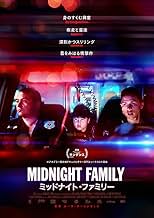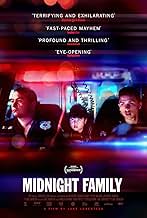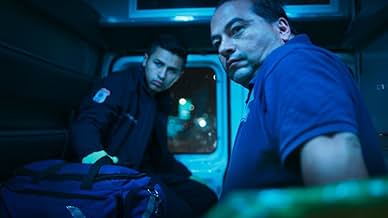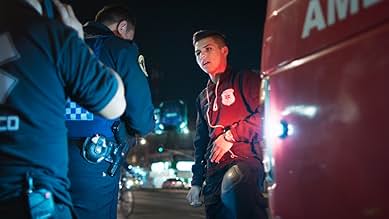PUNTUACIÓN EN IMDb
7,4/10
2,1 mil
TU PUNTUACIÓN
En el vecindario más rico de Ciudad de México, la familia Ochoa lleva un servicio privado de ambulancia, y compite con otros similares para beneficiarse de pacientes en necesidad de ayuda ur... Leer todoEn el vecindario más rico de Ciudad de México, la familia Ochoa lleva un servicio privado de ambulancia, y compite con otros similares para beneficiarse de pacientes en necesidad de ayuda urgente.En el vecindario más rico de Ciudad de México, la familia Ochoa lleva un servicio privado de ambulancia, y compite con otros similares para beneficiarse de pacientes en necesidad de ayuda urgente.
- Premios
- 26 premios y 26 nominaciones en total
Juan Ochoa
- Self
- (as Juan Alexis Ochoa)
Josue Ochoa
- Self
- (as Josué Ochoa)
Reseñas destacadas
THE FILM
"Midnight Family" is an intense documentary that looks at a side of healthcare in Mexico City that I had simply never heard of before. In a city with a population of 9 million the government runs only 45 public ambulances to serve the sprawled-out denizens. Instead, the city is mostly serviced by private individuals or groups who operate ambulances which try to make up for the paltry efforts of the government to meet the emergency services needs of the people.
The film focuses on the Ochoa family who operate one of these ambulances. We accompany them on several calls which range from bloody noses to fatal accidents over the course of a couple of weeks. As we get to know the different members of the family, we see how the difficult situation affects them in many ways. Bribes, unreliable and even rare payment, and competition with other ambulance services make their jobs very difficult, exhausting, and even hazardous to safety as well as their own mental health.
MY THOUGHTS If you want a documentary that has the intensity of a major motion picture, this is it. The runs in the city are hectic and, as different realities that Ochoa's deal with on a nightly basis happen on camera, I was constantly surprised at the morass of individual roadblocks there are to people in Mexico City receiving decent medical care. I learned a lot about the many faces that corruption and poverty wear in that city even as I realized how much I take for granted the benefits we enjoy in this country.
As much as I was learning, I was never for a second bored. This movie moves but it is also exhausting. When I got out of the theater I expected that the time would be around 8:45 pm but it was only 8:00 pm. The director and editor did a great job of packing this film with tension but also presenting the feeling of exhaustion and futility that this family has to deal with. As an audience member I couldn't help but feel for these guys
Unfortunately, while I was engaged greatly by the film, it does leave something to be desired when it comes to personal connection to the characters and does little to answer questions that an audience who knows little of the Mexican Health Care System. Why are there so few ambulances, are the private ambulances capitalizing on people's suffering, and how many of the patient's complaints are actually legitimate? These questions take total buy- in to the Ochoa's situation from automatic to requiring a conscious choice.
For a documentary, the film had remarkably immersive cinematography in some fantastically difficult situations to shoot. Specific choices that were made add dramatically to that sense of reality and do much to help you forget that you are watching a finely crafted film and not simply a fly on the wall document of fact.
Overall, this film really rocked me and sparked a very interesting conversation amongst those of us who saw it but keeps the film from having the sort of staying power that makes me want to remember it for years to come. It's a film that begs the audience to not ask too many questions but take everything at face value but also presents the main subjects as people of interest but also mystery, since they present a very one sided view of the situation which always seems a little suspect.
It doesn't answer every question you will ask as you drive home and discuss the movie after seeing it but it will keep you dramatically engaged throughout with a pacing that takes you from frenetic action to exhausted waiting for the next call. As this is the actual experience of this family, perhaps that is the best compliment we can give this film, film maker, and family.
The film focuses on the Ochoa family who operate one of these ambulances. We accompany them on several calls which range from bloody noses to fatal accidents over the course of a couple of weeks. As we get to know the different members of the family, we see how the difficult situation affects them in many ways. Bribes, unreliable and even rare payment, and competition with other ambulance services make their jobs very difficult, exhausting, and even hazardous to safety as well as their own mental health.
MY THOUGHTS If you want a documentary that has the intensity of a major motion picture, this is it. The runs in the city are hectic and, as different realities that Ochoa's deal with on a nightly basis happen on camera, I was constantly surprised at the morass of individual roadblocks there are to people in Mexico City receiving decent medical care. I learned a lot about the many faces that corruption and poverty wear in that city even as I realized how much I take for granted the benefits we enjoy in this country.
As much as I was learning, I was never for a second bored. This movie moves but it is also exhausting. When I got out of the theater I expected that the time would be around 8:45 pm but it was only 8:00 pm. The director and editor did a great job of packing this film with tension but also presenting the feeling of exhaustion and futility that this family has to deal with. As an audience member I couldn't help but feel for these guys
Unfortunately, while I was engaged greatly by the film, it does leave something to be desired when it comes to personal connection to the characters and does little to answer questions that an audience who knows little of the Mexican Health Care System. Why are there so few ambulances, are the private ambulances capitalizing on people's suffering, and how many of the patient's complaints are actually legitimate? These questions take total buy- in to the Ochoa's situation from automatic to requiring a conscious choice.
For a documentary, the film had remarkably immersive cinematography in some fantastically difficult situations to shoot. Specific choices that were made add dramatically to that sense of reality and do much to help you forget that you are watching a finely crafted film and not simply a fly on the wall document of fact.
Overall, this film really rocked me and sparked a very interesting conversation amongst those of us who saw it but keeps the film from having the sort of staying power that makes me want to remember it for years to come. It's a film that begs the audience to not ask too many questions but take everything at face value but also presents the main subjects as people of interest but also mystery, since they present a very one sided view of the situation which always seems a little suspect.
It doesn't answer every question you will ask as you drive home and discuss the movie after seeing it but it will keep you dramatically engaged throughout with a pacing that takes you from frenetic action to exhausted waiting for the next call. As this is the actual experience of this family, perhaps that is the best compliment we can give this film, film maker, and family.
Realistically showing the real life struggles of private ambulances in Mexico City.
With tons of Insert/Extreme-Closeup/Point-of-view shots, it keeps going upwards and downwards. Sometimes feel like a well written/acted family-drama, other times just a documentary, that's trying too hard.
Greetings again from the darkness. It would be easy to question why a family would choose to run a private ambulance service in a city where they may or may not get paid. It's only when we know one stunning statistic that their reasoning becomes clear. In Mexico City, the government operates only 45 ambulances for a population of nearly 9 million people. Director-cinematographer-editor-producer Luke Lorentzen takes us inside the ambulance with the Ochoas as they work the streets in the business they've run for almost 20 years ... it's a business that fills a necessary gap in emergency services.
Teenager Juan is the most talkative of the crew that includes his father, a younger brother and a friend of the family. We are never certain whether their service or vehicle is properly licensed, whether they are certified, or even if actual licenses and certifications exist. What we do know is that when a medical emergency occurs, a two-plus hour wait for a city ambulance makes the private services much more appealing ... and, quite frankly, necessary.
Mr. Lorentzen serves up some terrific camera work, focusing mostly on the family rather than the patients they are providing service for. In the blink of an eye, the Ochoa family goes from utter boredom to a life-and-death situation where response time is crucial. Timing is important not just for medical reasons, but for competitive ones as well. Often there are two races occurring - the race to reach the patient, and the race against another ambulance. What is clear is that once on the scene, the Ochoas are very professional and caring ... whether it's a gunshot wound, a child that's fallen four stories from a window, or a woman who has been physically assaulted by her boyfriend (and needs a hug, as well as an ambulance).
Corruption is everywhere in this cutthroat industry. From a government who refuses proper care for its citizens to a police force accepting bribes to private ambulance services on retainer from certain hospitals. For the Ochoas, the police scanner is as vital to their business as the medical supplies in the back where the youngest brother munches chips between calls. A loudspeaker is necessary as they race through the city streets admonishing cyclists and cab drivers to get out of the way for a medical emergency.
The Ochoas treat hundreds of patients each year, and when they aren't responding to calls, they are scrubbing the blood from the vehicle or resting up for another stressful night. We hear their philosophy in providing care for those who might not otherwise get to the hospital on time, and we understand this family does care very much about their chosen profession ... this in spite of the fact that so many refuse to pay them, or simply can't afford to. It's a constant hustle that keeps the family on the edge financially, although they can hold their head up high knowing they provide a valuable service. Lorentzen's camera work ensures we feel the intensity and stress of each and every call.
Teenager Juan is the most talkative of the crew that includes his father, a younger brother and a friend of the family. We are never certain whether their service or vehicle is properly licensed, whether they are certified, or even if actual licenses and certifications exist. What we do know is that when a medical emergency occurs, a two-plus hour wait for a city ambulance makes the private services much more appealing ... and, quite frankly, necessary.
Mr. Lorentzen serves up some terrific camera work, focusing mostly on the family rather than the patients they are providing service for. In the blink of an eye, the Ochoa family goes from utter boredom to a life-and-death situation where response time is crucial. Timing is important not just for medical reasons, but for competitive ones as well. Often there are two races occurring - the race to reach the patient, and the race against another ambulance. What is clear is that once on the scene, the Ochoas are very professional and caring ... whether it's a gunshot wound, a child that's fallen four stories from a window, or a woman who has been physically assaulted by her boyfriend (and needs a hug, as well as an ambulance).
Corruption is everywhere in this cutthroat industry. From a government who refuses proper care for its citizens to a police force accepting bribes to private ambulance services on retainer from certain hospitals. For the Ochoas, the police scanner is as vital to their business as the medical supplies in the back where the youngest brother munches chips between calls. A loudspeaker is necessary as they race through the city streets admonishing cyclists and cab drivers to get out of the way for a medical emergency.
The Ochoas treat hundreds of patients each year, and when they aren't responding to calls, they are scrubbing the blood from the vehicle or resting up for another stressful night. We hear their philosophy in providing care for those who might not otherwise get to the hospital on time, and we understand this family does care very much about their chosen profession ... this in spite of the fact that so many refuse to pay them, or simply can't afford to. It's a constant hustle that keeps the family on the edge financially, although they can hold their head up high knowing they provide a valuable service. Lorentzen's camera work ensures we feel the intensity and stress of each and every call.
Midnight Family is a captivating documentary. As an audience, the textual of the documentary seems to me like a interesting and successful mix of documentary and feature film. What I mean is that the content of the documentary is real thing that happened to the family and the filmmaker, while the shooting, neon-light style of lighting, storytelling and so on are quite delicate. The night scenes occupy the majority of the documentary body may be a reason as well. The director believes that there should not be a set boundary between the style of documentary and fictional film.
The documentary was shot in one-person crew. In other words, Luke Lorentzen himself. He had two shooting cameras with him. One of which was set on the car front window and the other was in the back of the car. While the director collaborated with his Mexican friend in the editing as to distance himself from the footage, as he admitted in a dialogue in Hong Kong. Because he himself witnessed those scenes, and the footage may work for him in the way that does not work for common audiences.
The director spent around a hundred days within the 2-3 years documenting the midnight family and made some follow-up shooting which at the end hold up the spiritual essence of the documentary. The director intends and manages to show audiences the undertow of the business of Mexican ambulance and the ordinary people within.
The director graduated from Stanford University.
The documentary was shot in one-person crew. In other words, Luke Lorentzen himself. He had two shooting cameras with him. One of which was set on the car front window and the other was in the back of the car. While the director collaborated with his Mexican friend in the editing as to distance himself from the footage, as he admitted in a dialogue in Hong Kong. Because he himself witnessed those scenes, and the footage may work for him in the way that does not work for common audiences.
The director spent around a hundred days within the 2-3 years documenting the midnight family and made some follow-up shooting which at the end hold up the spiritual essence of the documentary. The director intends and manages to show audiences the undertow of the business of Mexican ambulance and the ordinary people within.
The director graduated from Stanford University.
A fly on the wall exploration of a family barely surviving by operating a private ambulance in Mexico City. The contradictions are clear. The situations heartbreaking. The humanity obvious. The film making is compelling. A wonderful documentary. Thoroughly recommend.
¿Sabías que...?
- CuriosidadesDirector Luke Lorentzen edited the film as he was shooting for 60-70 nights over the course of 3 years. By the end of 2017 a locked cut was finished and submitted to Sundance, but the film got rejected. This made Lorentzen think that there might be more of a story to tell, so he went back to Mexico City to shoot for another 2 1/2 weeks, where ultimately ~80% of what ended up in the finished film was shot.
- ConexionesReferenced in The Rodolfo Rivas Project: Luke Lorentzen (2019)
- Banda sonoraMe Olvidé de Vivir
(J'ai Oublié de Vivre)
Music by Jacques Revaux
French lyrics by Pierre Billon
Spanish lyrics by Julio Iglesias
Performed by Julio Iglesias
Selecciones populares
Inicia sesión para calificar y añadir a tu lista para recibir recomendaciones personalizadas
- How long is Midnight Family?Con tecnología de Alexa
Detalles
- Fecha de lanzamiento
- Países de origen
- Sitios oficiales
- Idioma
- Títulos en diferentes países
- Midnight Family
- Localizaciones del rodaje
- Empresas productoras
- Ver más compañías en los créditos en IMDbPro
Taquilla
- Recaudación en Estados Unidos y Canadá
- 42.310 US$
- Fin de semana de estreno en EE. UU. y Canadá
- 3030 US$
- 8 dic 2019
- Recaudación en todo el mundo
- 51.712 US$
- Duración1 hora 21 minutos
- Color
Contribuir a esta página
Sugerir un cambio o añadir el contenido que falta






















